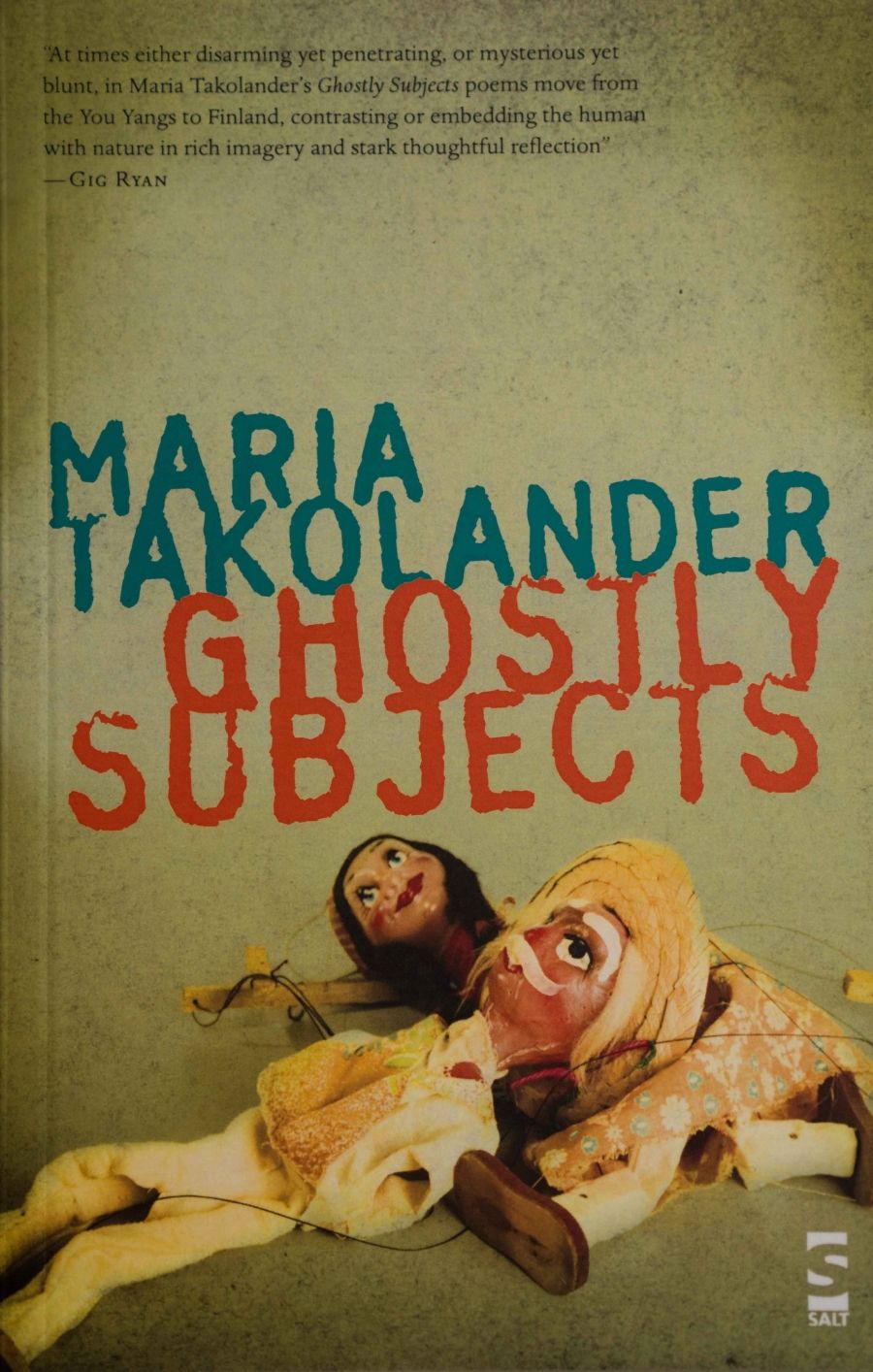
- Free Article: No
- Contents Category: Poetry
- Review Article: Yes
- Article Title: 'The gently ravenous'
- Online Only: No
- Custom Highlight Text:
In Ghostly Subjects, her first book-length collection, Maria Takolander brings a sharp, wide-ranging voice to various themes of haunting. What, after all, does it mean for a subject to be ghostly? Takolander reveals a fasci-nation with the ways that surfaces of many kinds might be disrupted within the poetic text – for example, the ways in which the present can be interrupted by the pressures of the past, or an external geography of landscape by the private desires of the heart, or the stage of global events by the graspable scale of the local. And as these boundaries blur and suffuse, Takolander’s poetry suggests that the subject is not only the world under the scrutiny of the poet’s eye, but also the subjectivities of poet and reader, both drawn into these shifting spheres of light, shadow, and surprise.
- Book 1 Title: Ghostly Subjects
- Book 1 Biblio: Salt Publishing (Inbooks), $24.95 pb, 80 pp
The collection pivots on certain themes and words. For instance, the image of the mirror recurs frequently, embodying the poet’s concern with the idea of a shimmering surface which seems to mediate between self and other, or between inner self and a self exposed or interpreted by the outside world. The mirror is a surface in which we may be tempted to look for truth, yet in fact it offers only shadows and slippery interpretations – whether this is the deceptive and misogynistic reflections of the ‘Cosmetics Department’, or the ‘mirror’ of the satellite lover who circles in an immensity in which ‘We’re all blind’.
The idea of the ‘alien’ also resounds throughout the collection, often linked with some kind of monstrous or uncanny birthing. Like the ghost, the alien is the thing of strangeness that is somehow lodged within the familiar, fascinating yet grotesque, and fundamentally disruptive to any notion of a fixed and stable self and subject. To look into a mirror and see the alien – and not the reassuring reproduction of the known self – is certainly to experience a kind of haunting, whether this is in relation to the ‘alien world’ of a grieving mother’s body of ‘oxygen and blood’, or to the alien in the ‘cruel mirror’ of ‘The Shining’, where ‘Children too are doubles: / Minotaurs in the corridors’, or to a profound ambivalence about female biology and reproduction, in which the voice of Mary Shelley comments, ‘I was given this body as haphazardly / As the monster of Frankenstein’.
Takolander is an academic, and there is a certain amount of academic playfulness in her poetry. The poetic subjects range widely, from the intimacy of the conventional lyric – beautiful poems of sexual love, of the complexity of children, of the poignancy of the elegy – to self-reflexive explorations of the world of poetry writing and production, or the amazing poem ‘Tides’, in which the terrorist train bombings of Madrid and the ‘unfathomable’ trauma associated with them are obliquely suggested through an austere imagery of oceans, of fish ‘dismembered’, and ‘Phones … ringing in the pockets of herrings’. While most of the poems are short, there is also an interest in the possibilities of narrative, and how poetic images might work together to suggest compressed and allusive stories. This is apparent in the haunted narrative of ‘Bedtime Story’, and in the aptly titled ‘Ghost Story’, in which the vault of a generalised night is literally brought down through sky and roof and memory to the specificity of ‘A man and woman fight’.
Ghostly Subjects also sees Takolander extending the idea of the ghostly into the palimpsest of the intertextual. Not only do we hear echoes of Freud (the double and the uncanny) and Shakespeare (the voice of Caliban), but in the book’s final section, ‘Culture’, the poet both uses other people’s art as a subject for her own musings and at times almost channels the voices of others – Mary Shelley, Stanley Kubrick, Sylvia Plath. Haunted, indeed, although as Takolander’s Mary Shelley puts it, these poems are haunted, ‘Not by death but by life / Which wants nothing / But to keep on being born’.


Comments powered by CComment